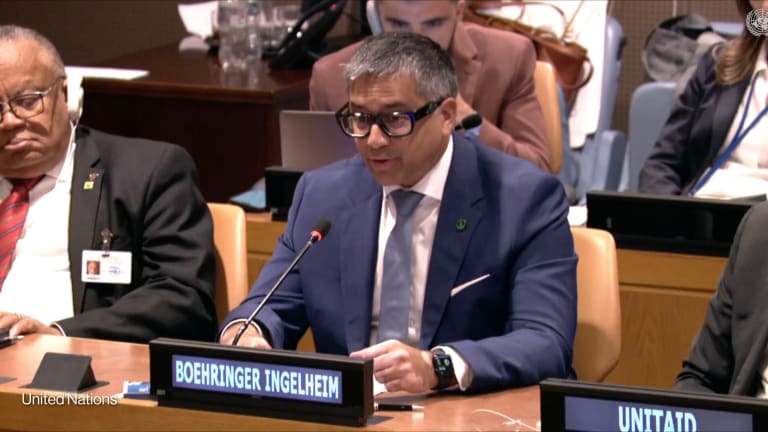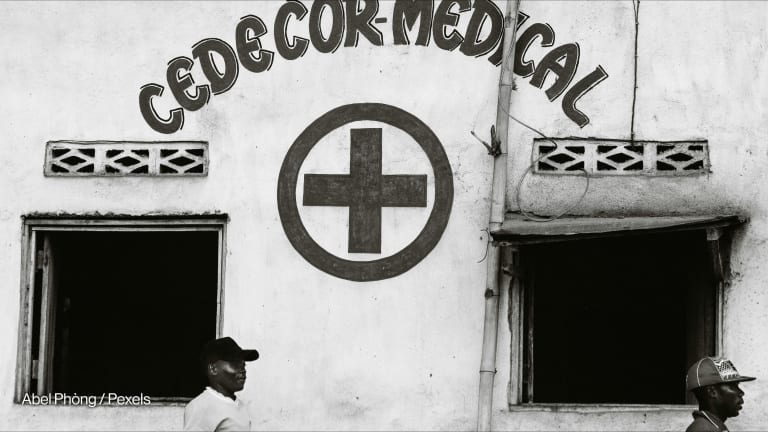
Last week, I joined over 400 representatives of governments, the World Health Organization, and civil society in Montevideo, Uruguay, for the WHO Global Conference on Noncommunicable Diseases. The purpose of the meeting was to strengthen policies and build political traction for the prevention and control of NCDs. The conference occurred at a pivotal moment, less than a year from the third UN General Assembly High-Level Meeting on NCDs in September 2018, and precisely when we are at a tipping point in the fight against what are largely preventable diseases resulting in premature deaths.
NCDs — primarily cancer, cardiovascular diseases, diabetes, chronic respiratory conditions, mental health, and neurological disorders — are responsible for 70 percent of deaths worldwide. Nearly three-quarters of these deaths occur in developing countries, four out of five of them prematurely. Already a major threat to health and development in the 21st century, the prevalence of NCDs — and associated human suffering — is increasing exponentially.
Current trends suggest that by 2025, the year by which governments have committed to achieve a 25 percent reduction in NCD mortality, one-third of the world’s population will be living with obesity, and more children will be struggling with being overweight or obese than with being underweight. If we continue along our current path, well over 320 million people will have died from an NCD since this article was published. And over 120 million of those deaths will have occurred among people under the age of 70, deaths that are largely preventable.
This is not to mention the experience of the millions of people living with NCDs — many with inadequate access to treatment and care — and with unaffordable or out-of-reach lifesaving medicines and technologies. And in many societies, people with NCDs face systemic stigma and discrimination in their communities and workplaces, largely due to ignorance and misconceptions surrounding these diseases.
While 31 million deaths are attributable to NCDs every year in developing countries, less than a scandalous 3 percent of development assistance for health is allocated to this issue — an embarrassing $1 billion in 2014. This is a drop in the ocean compared to the expected cost of the burden of NCDs to developing countries, estimated to amount to $7 trillion between 2011 and 2025, equivalent to the combined GDPs of France, Spain, and Germany in 2016.
You might assume that with this evidence and knowledge, global cooperation and national leadership would have sprung to action, that a sense of injustice would have set in and funding would be flowing to the most vulnerable to avoid future human and economic costs. And yet, incredibly, action to address NCDs is moving at glacial pace.
Alarm bells began to ring in 2014 when, at the second High-Level Meeting on NCDs, not a single president or prime minister showed up, and barely any ministers of health. If that is not a sign of political inertia, I don’t know what is.
Global reports on national progress on NCDs have been equally concerning, often referred to as “inadequate and uneven.” Today, less than half of all countries have national NCD plans and targets, which are the foundational building blocks of any national response. This is despite the global community having set a deadline to have these in place by 2015 — a sign that promises and commitments are not translating into action, and that accountability is insufficient.
Furthermore, despite having committed to a set of cost-effective intervention for NCDs, progress on implementing these is inadequate. Only 16 percent of countries have fully implemented tobacco taxes. Twenty-six percent of countries are doing well on salt reduction, and only 35 percent on marketing to children. Just 27 percent of countries are providing at least basic NCD services such as drug therapy and counselling to prevent cardiovascular disease and strokes.
Against this rather bleak backdrop, it is encouraging to see WHO Director-General Tedros Adhanom Ghebreyesus and his team demonstrating a determined and honourable commitment to make NCDs and health a political issue and to ensure that political leaders make NCDs a priority. Coverage of last week’s conference was dominated by news of the short-lived appointment of a goodwill ambassador for NCDs, but it distracted from important leadership demonstrated by other figures. The influence of outstanding champions last week in Montevideo — including presidents Tabare Vazquez of Uruguay, Michelle Bachelet of Chile, and Mauricio Macri of Argentina, along with WHO Global Ambassador for NCDs Michael Bloomberg, who has injected much-needed philanthropic funding into tobacco control and obesity prevention, and Dr. Sania Nishtar, who leads the just-announced WHO High-Level Global Commission on NCDs – is testament to the outreach of the WHO and others.
The leadership revealed in Montevideo is proof that the NCD response is primed, but success will require the combined forces of individual political champions and political blocs. We saw the impact of the G-20 this year under German leadership prioritize global health for the first time. The NCD Alliance and others are pushing for this to continue, next year under the presidency of Argentina and in 2019 under Japan, with NCDs as a specific focus. Other influential actors could include the Commonwealth, which was so instrumental in the leadup to the 2011 UN High-Level Meeting, the G-7 under the leadership of Canada, as well as the African Union, EU and BRICS, to name a few.
Another silver lining to last week was the willingness of the WHO director-general to enter into dialogue with representatives from civil society. The NCD Alliance organized a meeting with him and 20 civil society leaders on the sidelines of Montevideo to discuss the 2018 High-Level Meeting and the importance of prioritizing NCDs in the WHO General Program of Work. A central message emerging from that meeting was a recognition from the very top of the WHO that civil society is a key partner in the NCD response as it agitates, advocates, communicates, and holds governments to account for the promises made.
Behind each number used to quantify the burden of NCDs stands a person. At the conference in Montevideo, I shared stories of young people such as Leticia, from Mexico City, living with obesity, and Robert, living with undiagnosed Type 1 diabetes in a Ugandan village, whose parents were faced with a “choice” between saving their son or providing for the rest of their family.
Individuals at risk of, and living with, NCDs have families, stories, and a right to live long and healthy lives. But accidents of geography and poverty are still tragically cutting lives short. In the 21st century this is unacceptable and inexcusable.
We do have a choice. We can either sleepwalk our way into a sick future as we are currently doing, or our political leaders can decide that hundreds of millions of lives are indeed worth saving and that we must fall on the right side of history. The past few days have shown that there are opportunities for strong, respected political leaders to join President Vazquez as champions and ambassadors in the fight against NCDs — leaving us to ask “Who will step up?”
Join the Devex community and access more in-depth analysis, breaking news and business advice — and a host of other services — on international development, humanitarian aid and global health.








